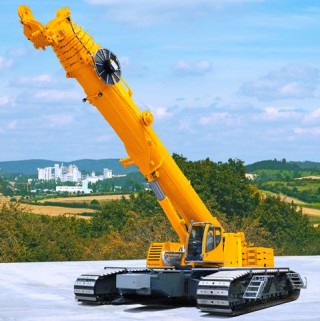The new LTM 1750-9.1 wheeled crane fits near the top end of the Liebherr all-terrain range, between the LTM 1500-8.1 (500t capacity) and the monster LTM 11200-9.1 (1200t capacity).
Liebherr says the LTM 1750-9.1 can travel on public roads with the complete 52m telescopic boom already fitted.
A broad range of boom attachments are available including jibs for extra reach and the Y-guying system for extra lateral stability and hence lifting power. Maximum height under hook is 154m and maximum outreach is 112m. The luffing fly jib can be extended in 3.5m increments, out to 91m. The luffing of the fixed lattice jib, up to 62m long, can - as an option - be carried out hydraulically, which means that the jib can also be adjusted under load. A special auxiliary jib, with a load capacity of 56 tonnes, is also available for operation on the telescopic boom, on the fixed jib, and on the luffing jib.
The carrier is powered by an eight-cylinder500kW Liebherr diesel engine with a torque of 3,000Nm. A 12-speed ZF-TC-Tronic transmission transfers power to the axles. The four rear axles are actively steered electro-hydraulically and speed-dependent, which increases the manoeuvrability of the vehicle and reduces tyre wear.
The Liebherr four-cylinder in-line engine in the crane superstructure delivers 270kW and a torque of 1,720 Nm. The crane drive, which is provided with power steering and power regulation, is a diesel hydraulic system with five axial piston adjustment pumps.
The 220t-rated LTR 1220 (pictured below) is Liebherr’s fourth telescopic boom model to be mounted on crawler tracks. It joins the LTR 1060 (60t), LTR 1100 (100t) and the rather different concept LTR 11200 (1200t).
Liebherr says that tele crawlers like these combine the off-road capability of crawler cranes with the quick set up time made possible by telescopic booms

The LTR 1220 can extend or retract its 60m boom even with a load on the hook. Derived from the boom of the LTM 1220-5.2 all-terrain, the boom of the LTR 1220 can be extended by a biparted swing-away jib, 12.2m to 22.2m long, which can be lengthened still further with two 7m lattice sections. As well as this, a 7m lattice section is also available, which is fitted between the telescopic boom and the swing-away jib, to raise the connection point of the jib, capable of being luffed by up to 45°. As an option, the swing-away jib can also be adjusted hydraulically. Under full load, the jib can be moved between 0° and 45°.
The new crawler crane is powered by a 230kW seven-cylinder in-line diesel engine. The hoist gears provide a high cable pull of 105 kN.
Liebherr says that one main area of use for the LTR 1220 is the installation of prefabricated components. With a 3.4m erection jib and the second hoist gear, installation work can be carried out in two-hook operation.
The basic machine, with metre-wide crawler carriers, weighs in at about 90t and has a minimum overall width of 5.01m. With crawler tracks removed, the unit weighs about 54t, including the jack-up cylinders and the transverse beams, and is only 3m wide and 3.2m high. By removing the transverse beams, the weight can be reduced still further, to about 47t.
The crane is capable of assembling itself, without the need for a second crane. The basic unit is driven to the site on a low-loader, and then supports itself on the jack-up cylinders. Central ballast, transverse beams, crawler carriers, and superstructure ballast are installed without any need for an auxiliary crane.
Got a story? Email news@theconstructionindex.co.uk



